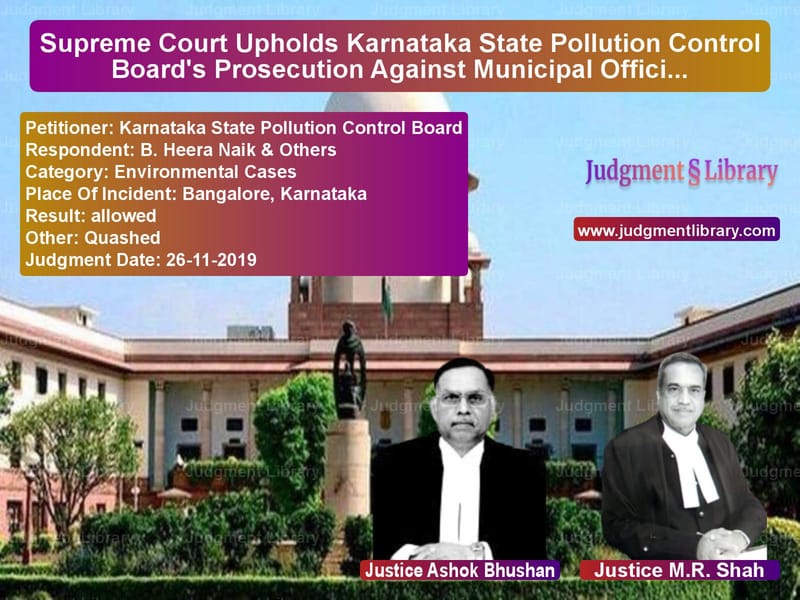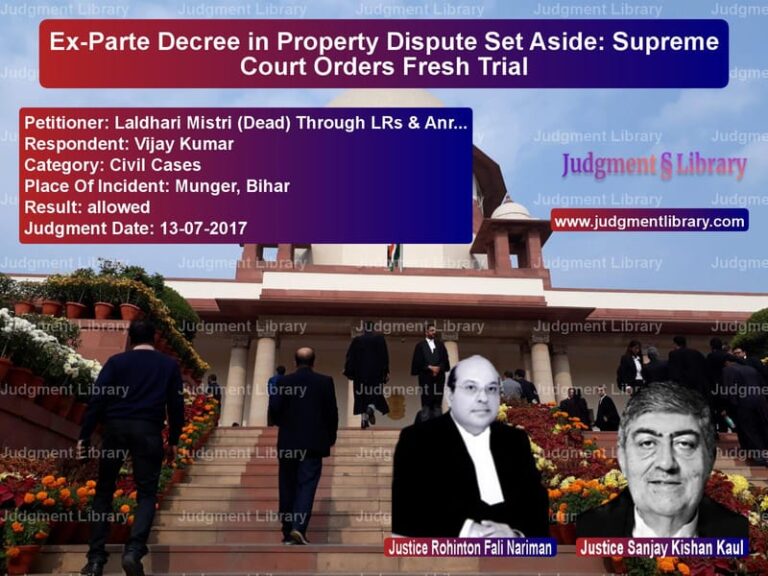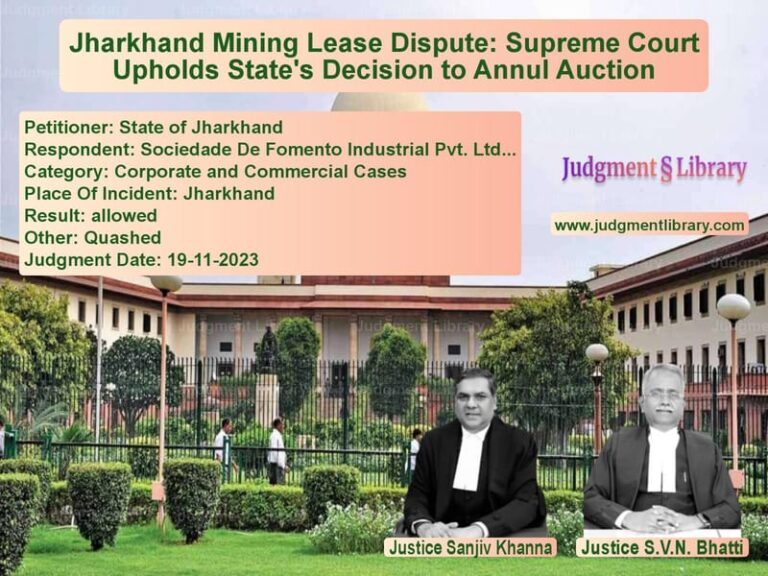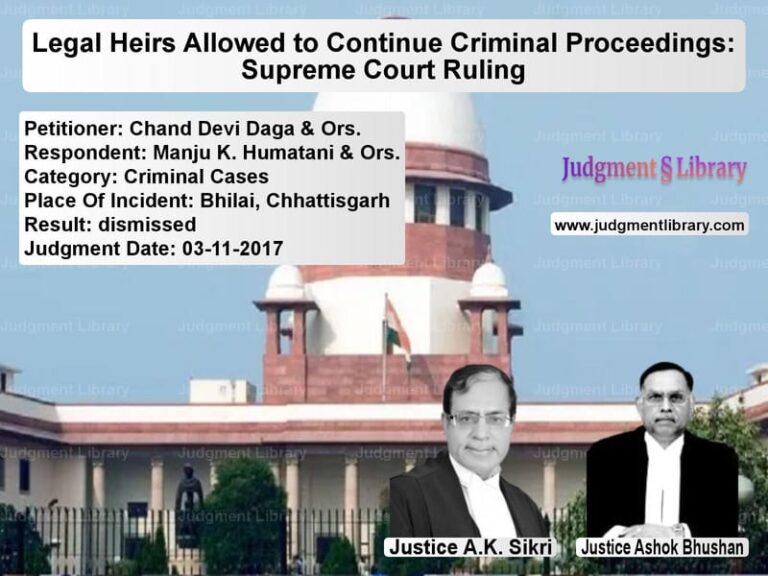Supreme Court Upholds Karnataka State Pollution Control Board’s Prosecution Against Municipal Officials
The Supreme Court of India, in its judgment in Karnataka State Pollution Control Board vs. B. Heera Naik & Others, addressed the liability of municipal officials under the Water (Prevention and Control of Pollution) Act, 1974. The case revolved around the prosecution of municipal commissioners and chief officers of City Municipal Councils for failing to establish sewage treatment plants (STPs) and discharging untreated sewage into water bodies.
The Karnataka High Court had earlier quashed the criminal proceedings initiated against these officials, ruling that they could not be prosecuted under Section 48 of the Act, 1974, as they were not considered ‘heads of departments.’ However, the Supreme Court set aside this ruling and held that municipal officials could be held accountable for violations of pollution control laws.
Background of the Case
The Karnataka State Pollution Control Board (KSPCB) had filed complaints against municipal officials, including the commissioners of City Municipal Council, Krishnarajapuram, and other municipalities, for:
- Failure to renew consent for discharging sewage after June 30, 2006.
- Non-establishment of sewage treatment plants, as mandated by the Pollution Control Board.
- Continuous discharge of untreated sewage into lakes, ponds, and natural valleys, violating Section 25 of the Act, 1974.
The officials challenged the complaints under Section 482 of the Code of Criminal Procedure (CrPC) before the Karnataka High Court, which ruled in their favor, leading to the quashing of the prosecution. The Pollution Control Board appealed to the Supreme Court.
Petitioner’s (KSPCB) Arguments
- The municipal bodies had legal obligations to prevent pollution and comply with environmental regulations.
- Commissioners and chief officers were responsible for ensuring that sewage treatment facilities were in place.
- The officials’ negligence resulted in the contamination of water bodies, which amounted to a serious violation of public health and environmental laws.
- The High Court erred in ruling that these officials were not ‘heads of departments’ under the Act, 1974.
Respondents’ (Municipal Officials) Arguments
- The prosecution was invalid as municipal officials were not designated as ‘heads of departments’ under government law.
- Municipal bodies, as independent corporate entities, should be prosecuted separately from individual officials.
- The officials were acting under the instructions of the state government and could not be held personally liable.
- The High Court had correctly ruled that criminal liability could not be imposed on them.
Supreme Court’s Judgment
The Supreme Court rejected the High Court’s reasoning and restored the criminal proceedings against the municipal officials, ruling that:
1. Municipal Officials Can Be Prosecuted Under Pollution Laws
- The Court ruled that municipal commissioners and chief officers were directly responsible for pollution control measures.
- It held:
“The responsibility of ensuring compliance with environmental laws cannot be avoided by claiming that municipal officials are not ‘heads of departments.’”
2. Quashing of Prosecution by High Court Was Erroneous
- The Court ruled that the High Court wrongly relied on past judgments that were not applicable to this case.
- The judgment stated:
“The High Court’s interpretation that municipal officials are immune from prosecution is incorrect and contrary to the statutory scheme of the Water Act.”
3. Pollution Control Is a Legal Obligation
- The Court emphasized that local government bodies must strictly comply with environmental laws.
- It noted:
“Municipal bodies cannot discharge untreated sewage into natural water bodies without facing legal consequences.”
4. Criminal Liability Extends to Municipal Officials
- The Court ruled that municipal commissioners and chief officers were responsible for ensuring sewage treatment facilities were functional.
- The Court held:
“Failure to comply with environmental regulations constitutes an offense, and officials cannot escape liability.”
5. Local Bodies Are Not Above the Law
- The Court rejected the argument that municipalities, as corporate entities, should be prosecuted separately from officials.
- It stated:
“Holding officials accountable is essential for ensuring compliance with pollution control laws.”
Impact of the Judgment
This ruling has significant implications for environmental governance and municipal administration:
- Ensures Accountability: Municipal officials can be prosecuted for environmental violations.
- Strengthens Pollution Control Laws: Affirms that violations of sewage treatment regulations will not be tolerated.
- Prevents Environmental Degradation: Reinforces the obligation of municipalities to manage sewage and protect water bodies.
- Limits Abuse of Legal Immunity: Clarifies that public officials cannot escape liability by citing administrative technicalities.
Conclusion
The Supreme Court’s ruling in Karnataka State Pollution Control Board vs. B. Heera Naik & Others is a landmark judgment that upholds environmental accountability. By allowing the prosecution of municipal officials, the Court has reinforced the principle that government bodies must comply with environmental regulations. This decision will serve as a precedent for similar cases where public officials neglect their duties in pollution control and environmental management.
Petitioner Name: Karnataka State Pollution Control Board.Respondent Name: B. Heera Naik & Others.Judgment By: Justice Ashok Bhushan, Justice M.R. Shah.Place Of Incident: Bangalore, Karnataka.Judgment Date: 26-11-2019.
Don’t miss out on the full details! Download the complete judgment in PDF format below and gain valuable insights instantly!
Download Judgment: Karnataka State Poll vs B. Heera Naik & Othe Supreme Court of India Judgment Dated 26-11-2019.pdf
Direct Downlaod Judgment: Direct downlaod this Judgment
See all petitions in Environmental Cases
See all petitions in Public Interest Litigation
See all petitions in Fundamental Rights
See all petitions in Legislative Powers
See all petitions in Judgment by Ashok Bhushan
See all petitions in Judgment by Mukeshkumar Rasikbhai Shah
See all petitions in allowed
See all petitions in Quashed
See all petitions in supreme court of India judgments November 2019
See all petitions in 2019 judgments
See all posts in Environmental Cases Category
See all allowed petitions in Environmental Cases Category
See all Dismissed petitions in Environmental Cases Category
See all partially allowed petitions in Environmental Cases Category







